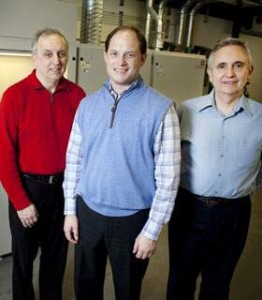Apr 25 2014
A University of Cincinnati College of Engineering and Applied Science (CEAS) spin-off company, General Nano, has been named a finalist of the 2014 Business Courier Innovation Awards.
 Founders of General Nano (from left to right): Mark Schulz, Joe Sprengard and Vesselin Shanov.
Founders of General Nano (from left to right): Mark Schulz, Joe Sprengard and Vesselin Shanov.
The young company, which manufactures nanoscale materials for aerospace and defense applications, licenses inventions from UC. General Nano previously won the Engineering Innovation Award at the 2013 Business Courier Innovation Awards.
Mark Schulz, CEAS Department of Mechanical and Materials Engineering professor, Vesselin Shanov, CEAS Department of Biomedical, Chemical, and Environmental Engineering associate professor, and Joe Sprengard, president and CEO of General Nano, founded the company in 2009. Based in Norwood, the firm specializes in developing carbon nanotube materials for aerospace and defense applications. Their customers include the Department of Defense, NASA, and numerous aerospace and defense original equipment manufacturers and Prime Contractors.
Carbon nanotubes are carbon atoms arranged in hexagonal patterns forming a tube. They are one hundred thousandth of the width of a human hair, possess twice the strength of any other engineering material on Earth, serve as excellent thermal and electrical conductors, and they have the potential to replace the use of copper and aluminum. In 2007, a UC research team led by Shanov was credited with creating the longest carbon nanotube forests ever, measuring 18 millimeters.
General Nano’s exotic materials have been attracting the attention of numerous investors, including the United States military. Recently, the Office of Naval Research awarded the company $1.3 million to conduct work on structural composites and energy storage devices over a span of two years.
The only nanotube materials that are currently commercially available are usually short in length and come in powder form to be used in coating and fillers. General Nano synthesizes the materials using a special catalyst particle—their “secret sauce,” if you will—that lasts significantly longer during the high temperature and pressure production process. This particle promotes the nanotubes to grow longer.
According to Sprengard, “General Nano’s sheet and tape products could replace copper and aluminum in some military systems. One reason is that in aerospace, everything is about weight and nanotubes weigh much less than either copper or aluminum.”
Among the various applications of these carbon nanotube materials is the ability to expend heat from electronics boxes in satellites or missiles and also, to apply the materials’ light-absorption properties to coatings for space instruments.
In addition to the military and aerospace applications, Sprengard said the technology has sparked interest in other fields where the ability to remove weight without sacrificing other properties is attractive.
“We’re already seeing interest in the automotive and energy sectors,” he said, citing wind energy in particular. “A lot of the work we’re doing is transferable to wind technology. They need turbine blades that are longer, stronger and more conductive so they don’t ice up.”
To date, General Nano has accumulated $5.8 million from Ohio, the Department of Defense and private investors. The Ohio Third Frontier technology funding initiative donated $2 million of that total to make advanced materials a focus for the firm.